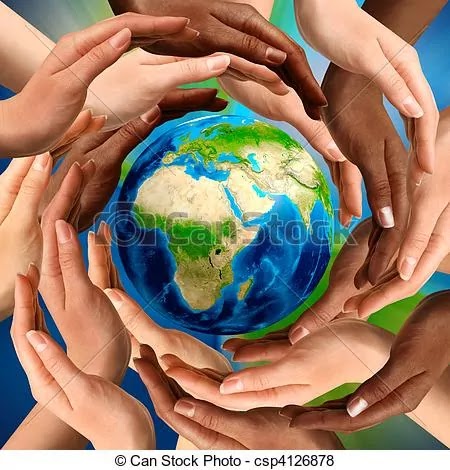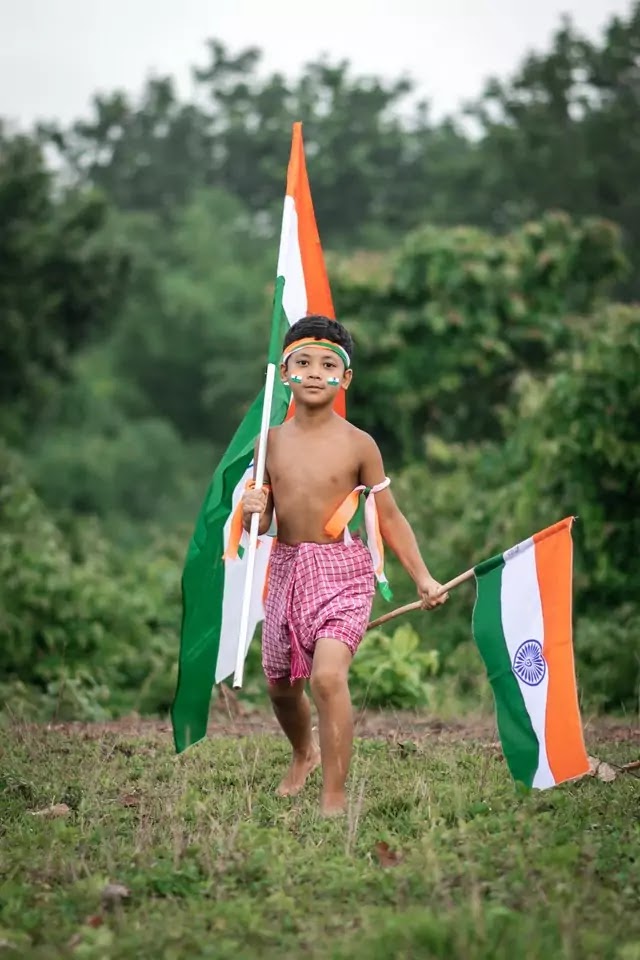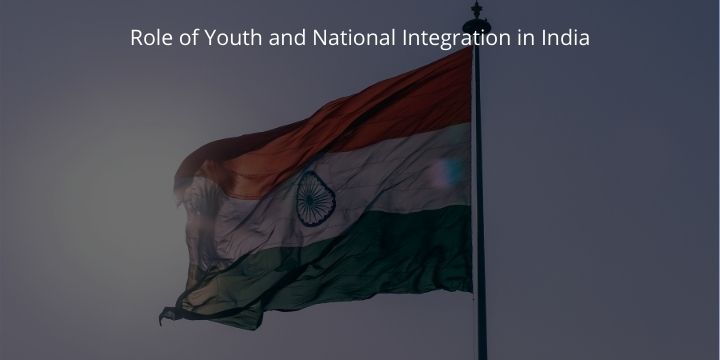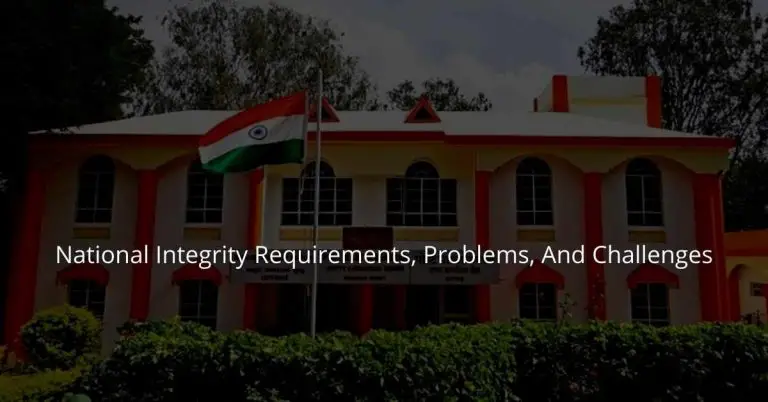Challenges in the path of national integration in new India
National integration
National integration does not mean that there is no disagreement between people on any issue in the country, but despite the differences, if all people in the country adopt the same thought, it is called unity. integration promotes a sense of patriotism among all citizens and they first consider themselves to be citizens of India and only then do they recognize Hindu, Muslim, or other sentiments.

Despite the differences in views and beliefs, if all people in a country are connected with mutual love, unity, and brotherhood, then the only reason is national integration. National unification is a sentiment that reflects solidarity or patriotism among the people of a nation. It promotes a common identity among the citizens of a country whereby all citizens experience unity among themselves.
India is an important example of national integration. Very few countries have the same diversity as our country. There are people from different castes and communities, whose lifestyles, cultures, languages , and customs are completely different, but they all live together because all people are bound by the formula of national unity.
National integration plays an important role in strengthening and organizing the country. The task of uniting people of different religions, sects, castes, costumes, civilizations, and cultures is possible thanks to national integration and, despite the many differences, all people live in mutual harmony.
Termination of Child Marriage|World Report 2020
National integration VS Separation
Integration guarantees long-term peace in the country. It is necessary for the excellence of an organization or society without which the well-being of any organization or society is not possible. Without unity, no society can achieve the status of an ideal society: integration unites a society or a country, while segregation or disintegration is destructive to society.
Society is divided by disruptive forces, while unity keeps people on an emotional level and brings society and the country to the pinnacle of achievement, on the other hand, the lack of mutual harmony leads society to destruction.
If several thin threads are combined together, they can also bind a stubborn and powerful animal but they are also unable to tie straw if the same threads are different. It is always good to be part of an organization because the organization is a symbol of progress and, similarly, the house that is united is always full of peace and happiness.
Even if a person is poor, but if he remains united in his family or organization, he can never be unhappy. But in the house where disruptive conditions persist, the people in that house remain in poor condition, no matter how much money they have.
The mainstay of Indian integration
Our country is a country of different cultures and that is why it has a unique identity throughout the world. Despite linguistic, cultural, and regional variations, the Indian people have managed to maintain national integration and integrity.
India is a confluence of different cultures, religions, and communities and gives the same status to all religions and sects. That is why despite the variations, the country’s citizens have a sense of unity for centuries. We have always adopted a liberal vision and we respect truth and non-violence.
India’s multi-layered ethos is rooted in its ethnic, cultural, and religious diversity. No other country in the world offers creativity, culture, religion, caste, and diversity of languages and dialects on such a large scale. India is the second-largest country in Asia and the seventh-largest in the world and is also the second-largest country in the world.
As a thriving civilization from 2500 BCE, India represents a wonderful confluence of various religions, creeds, beliefs, and beliefs. All the major religions of the world: Hindu, Sikh, Buddhist, Jain, Islam, and Christianity, including their sects, are found in India with complete independence.
India follows the ideal of Sarva Dharma Sambhav (equal respect for all faith systems) established since ancient times. This has not only allowed tolerance for all religions and beliefs but has also given them the freedom to pursue their ideas and philosophies.
Hinduism does not represent just one religion but is a syncretism of many creeds and beliefs that are divided into various castes, sects, and subsects.
Therefore, in a pluralistic society, different religions and creeds have the opportunity to prosper with the unique experience that India provides. Because of this, not only have great learning centers on different religions and religions been built here, but there are also many opportunities to learn about various legends, religious legends, holy temples, and pilgrimages.
India is not limited to a single region or state, but is spread across the country and has earned a unique achievement as a pilgrimage center for followers of almost every major religion in the world.
Importance of national integration.
Nations are created by the power of integration. Without unity in every section of its population, no country can progress. There is a lot of power in integration, even a strong enemy can be defeated with the force of integration.
Divided people and fragmented societies break easily. There can never be progress under disruptive conditions, but only decay and decay by dissolution. A society that is organized and tied to the thread of integration can never be defeated because unity is the greatest power in itself,
But any society in which dispersal situations exist easily falls prey to any attack. A small organized society is better than a very large disintegrated society. If we want to build an ideal society, we must advance on the path of unification.
National integration begins at home
There is a need for unity in the family before discussing national integration. Unless there is unity in the houses, it is not possible to integrate society, the nation, and the world. Only through unity can a society develop. A sense of organization is created in an inclusive society that leads to lasting peace and happiness.
As long as unity in households and society is strengthened, the nation also remains strong. External powers, in these circumstances, do not affect the integrity and sovereignty of the country. But every time national unity is weakened, the nation has to face a crisis situation.
If we turn the pages of our country’s history, we discover that every time national unity in our country weakens, every time external forces take advantage of it and we have to be under them.
Need for national integration in India

National integration is essential for any country. In a country full of immense inequalities like India, the unification works as a connecting factor. For the past few years, Pakistan has been trying to weaken national unity by widening the gap between Hindus and Muslims and sparking anti-Indian sentiment and extremism in Kashmir.
The British ruled India for hundreds of years through these divisive policies. But when the people of India, forgetting all their differences, demonstrated “indigence”, the British had to return from India.
National integration and unity are definitely necessary for the stability of democracy, the defense of freedom, and the general development of the nation. There will be no economic development or progress in the country until the entire nation tries to adopt the spirit of integration.
Therefore, it is the duty of all citizens of the country to play an important role in strengthening national unity to promote national integration. We need to become a strong nation to protect national unity, and therefore we must suppress disruptive forces while staying away from trivial ideas related to casteism, regionalism, religion, etc.
Challenges on the path to national unity in modern India
In ancient times, Indian culture was easily assimilated to other cultures, but now this feature has largely disappeared. As a result, residents of one state are sometimes unable to show tolerance for the customs, traditions, and languages of people in other states.
Along with the narrowness of the culture, there has been such a huge increase in disruptive forces that national integration has now taken the form of a complex problem. To solve this problem, we have to overcome all obstacles on the path of national integration and unity.
The following are the challenges for national unity in India:
1. Casteism: Casteism is a major obstacle on the road to national unity. In India, there are tremendous differences between residents belonging to different religions and castes. Here followers of caste or religion consider themselves superior to those who believe in other religions or castes.
These trends sometimes become so narrow and ugly that people cannot adopt the broad vision necessary for the national interest.
2. Communalism: This is a major obstacle on the road to national integration. Our country has followers of various religions such as Hinduism, Islam, Christianity, etc. In general, all citizens live in harmony with each other but sometimes vested interests create feelings of mutual enmity and hatred, leading to communal conflict. To maintain national integration, we have to curb communal tendencies.
3. Provincialism: Provincialism is also a major obstacle on the road to India’s national unity. On the one hand, there is a growing trend of a struggle for the creation of new states on the basis of language, on the other hand, each state wants to take a controlling stake in the center. The narrow sense of provincialism in various states of the country is increasing mutual enmity between the states.
4. Different political parties: in a democracy, it is necessary to have political parties to build public opinion and political conscience. This is the reason why various parties were formed in our country after independence. Unfortunately, there are many parties that ignore public and national interests on the basis of caste, religion, creed, and region. In a way, they are engaged in the work of national disintegration.
5. Linguistic difference: In a vast country like India, there is a need for a national language that can be spoken and understood in all regions. But due to narrow regional views, Hindi or any other language has not yet been accepted as a means of dialogue by all people in the country. Nor does the policy on linguistic identity allow people to overcome differences related to language.
6. Economic inequality: social and economic diversity is very widespread in our country and only a few people are prosperous in the country. Most people in the country are poor and making a living for the poor remains the biggest problem they are so busy solving that they are completely unable to think of national integration. Therefore, there is a major obstacle in the path of economic inequality and unity, and national integration.
conclusion
For a developing country like India, which has been a victim of slavery for years, it is necessary to strengthen national unity to avoid threats such as communalism, casteism, and regionalism. These separatist tendencies undermine national unity and lead to situations of bloodshed, genocide, and riots, etc.
In addition to external elements, external forces also obstruct the path of national unity. People who hate the independence and progress of a country always try to divide and disintegrate it. Similarly, the flourishing militancy in Kashmir is sponsored and supported by outside forces. Prolonged turmoil conditions in Kashmir and Northeast India have drawn the wrong youth from these regions away from the national mainstream.
When the number and strength of these disruptive elements increases, they attempt to complete isolation. India is a country with great geographical diversity where people of many religions, castes, tribes, and sects live. These diversities that are the pride of our shared culture, when distorted by vested interests, create barriers to unity and national integration.
To maintain national unity, it is necessary to pay special attention to all the elements necessary for national unity, such as the Constitution of India, our national symbols, national festivals, national anthems, and social harmony, etc.
To maintain national independence and sovereignty, we need to remember the stories of the great patriots who sacrificed their lives to maintain national independence and sovereignty. National integration is fostered by following the ideals of the great patriots and following the path suggested by them.




certainly like your web-site however you have to test the spelling on quite a few of your posts.
A number of them are rife with spelling issues and I find it very troublesome to tell the truth on the other hand I’ll surely come again again.
I’m truly enjoying the design and layout of your blog.
It’s a very easy on the eyes which makes it much
more enjoyable for me to come here and visit more often. Did you hire out a developer to create your theme?
Great work!
This paragraph provides clear idea in favor of the new viewers of blogging, that genuinely how to do blogging.
Hello, I enjoy reading through your article. I wanted to
write a little comment to support you.